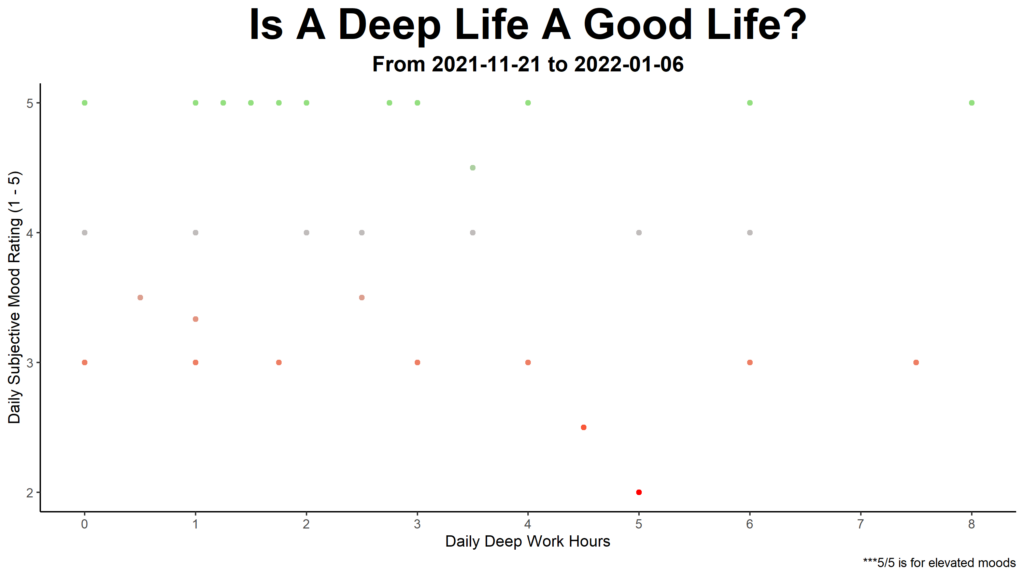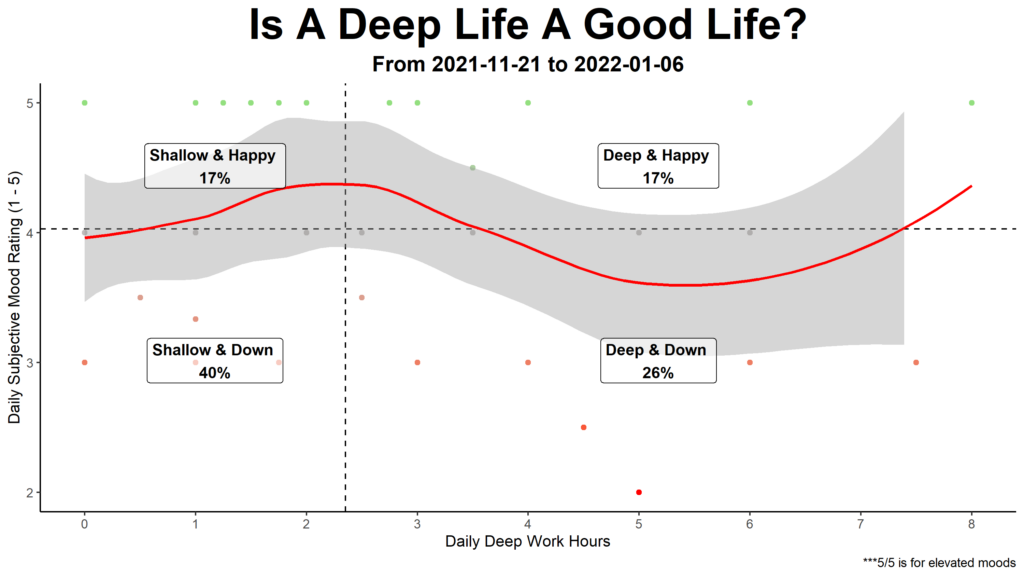I just finished reading Cal Newport’s book titled: Deep Work – Rules for Focused Success in a Distracted World. It was a good read and I would recommend it to any knowledge workers who are struggling with focus and getting serious work done. The author defines deep work as:
Professional activities performed in a state of distraction-free concentration that push your cognitive capabilities to their limit. These efforts create new value, improve your skill, and are hard to replicate.
Definiton of deep work according to Cal Newport
The intro of the book concludes with the following sentence: “I’ll try to convince you to join me in the effort to build our own personal Bollingen Towers; to cultivate an ability to produce real value in an increasingly distracted world; and to recognize a truth embraced by the most productive and important personalities of generations past: A deep life is a good life.” This article aims to quantitatively test the last part of that sentence.

To do so, we need measurements of how deep each day was and how good those days were.
The depth measurement is the most straightforward. I simply created a Google Forms to track the approximate number of deep work hours I completed in a day. I set up a daily reminder in my Google Calendar at 5 PM with the link to make sure I don’t forget.
Luckily for me, I did not have to do extra work to measure how good each day was. I have been tracking my mood with the Daylio app for over 1000 days now (see video). I could have added another question to the forms to measure the overall mood of the day if I didn’t already track my mood.
Armed with this three-columned dataset, we can start to explore whether or not a deep life is a good life.

Each dot in the picture above represents one day’s worth of data. An observation at the bottom-left corner of the graph would represent a day with not much deep work done (x-axis) and a low subjective mood rating of the day on a scale of one to five (y-axis). As you can see, the overall mood of each day tends to hover between three and five while the number of deep work hours rarely surpass three. There is no clear relationship between the number of deep work hours completed in a day and the subjective mood of that day. Let’s add a few things to our graph.

The dashed lines in our new graph above represent the overall average values of deep work hours (vertical line) and the average mood in the sample (horizontal line). The red curvy line tries to model the relationship between the two variables. Unsurprisingly, there is no clear trend. Finally, we see that 17% of the days were in the upper-right quadrant where there was an above-average mood and amount of deep work done.
Recall that Cal Newport’s claim was that “A deep life is a good life“. He did not claim that more deep work is necessarily better. Thus, let’s try to compare the days with none to very little deep work accomplished (30 minutes or less) to the days with more than 30 minutes.
| Type of Day | Number of Days | Average Mood | Mood Standard Deviation |
| Shallow | 12 | 3.96 | .62 |
| Deep | 35 | 4.05 | 0.89 |
We see that there were more deep days (more than 30 minutes of deep work) than shallow days in the sample. Deep days had a slightly more elevated mood (4.05 compared to 3.96).
Is this difference statistically significant?
No. The p-value of the t-test is quite large (0.73). Thus, we cannot conclude that the days with deep work are significantly associated to a higher mood.
Closing Remarks
It is crucial to keep in mind that 47 days’ worth of data is not enough to run away with our conclusions. The time period included the holidays when not much deep is done and the mood tends to be elevated. This is an n=1 study. the results can only be extrapolated to myself. Everyone is bound to respond differently to deep work.
Deep work might not have significantly improved my mood thus far but I’m confident that it allowed me to create new value, improve my skill, and create things that are hard to replicate.
The data used for this article is accessible on my GitHub page.
Read This Next
- What I Learned from Tracking my Mood for 1000 Days
- My 10-day Vipassana Silent Retreat Experience
- The Do-Nothing Morning Routine Experiment
- Atomic Habits – Book Notes
- Three Questions for Success
- The Parallel Universes of Time and Money
- Why I Do Not Drink Coffee
- The Visual Display of Quantitative Information by Edward R. Tufte (2nd Edition)
- Productivity for Students
- How To Read Research
